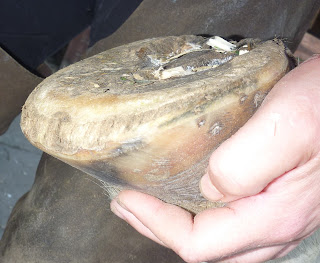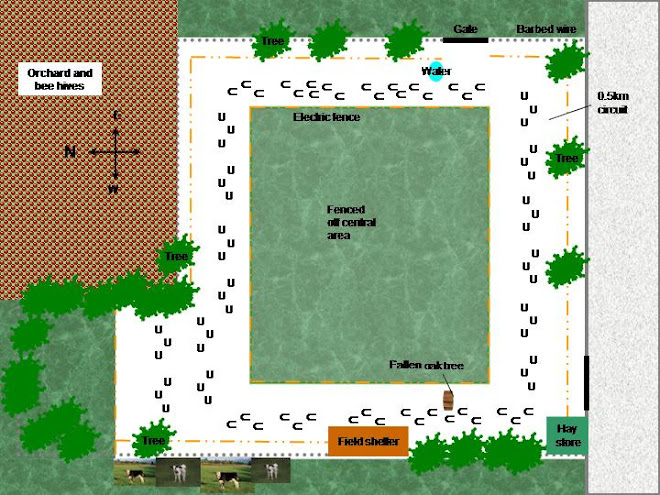I'm giving you just one photo. Tell me what you see. There is a huge amount of background to this with more photos, but first I want your views. So if you want more photos of this case you need to work a little for it! :-)
Shoes mask weaknesses, barefoot highlights strengths
Wednesday, 31 August 2011
Saturday, 20 August 2011
Sweet dreams - who said WBs can't go barefoot?
 |
| Wow! look at them go :-) |
 |
| Tracks don't have to be over complicated |
Someone (the local 'expert') confidently told me that warmbloods can't go barefoot. Fortunately these guys don't suffer ear mites.
Three warmbloods (only two shown) all barefoot, all confident over a variety of surfaces and having a blast now they can hack out without slipping. Their carer has been brilliant, an example to us all of how to do it. Lots of observation, an open mind and the horses' health always a priority.
And what a great track! Lucky lucky them, but for those without this blessing - these guys got good barefoot before they got the track. It can be done and you know what - I tend to find WB's make excellent barefooters. But just don't feed them 'junk' - it messes with their heads as well as their feet.
Labels:
barefoot warmbloods,
track system
Friday, 19 August 2011
Hoof shape and shoes
Same hoof as previous; but solar view. Note how the widest part of the foot is moving towards the heel. You might find it hard to see, but the sole is increasing (slowly) in thickness and concavity. Also note how the frog has quickly widened and how it was somewhat cramped by the shoe.
 |
| 30 05 11 |
 |
| 24 07 11 |
 |
| 11 08 11 |
Navicular and 'metabolic' - 10 weeks 3 days
By kind and generous permission of the carer.
Vets have given a 'Navicular' diagnosis. Horse on presentation has very thin soles, fronts are running forward, heels are collapsed, bulbs pointy rather than full, toe wall has been rasped out in places, frog is squishy (but not rotten, just unused), digital cushion is undeveloped (on palpation) and there is some red in the white line.
Subsequent trial and error shows the horse is sensitive to grass, probably oats and haylage. Does better on night time turnout with soaked hay in the day. Horse is on/off footy depending on circumstances but is generally improving. Progress would probably be faster if 24/7 turnout on a grass free track could be provided. But this carer has chosen to learn how to manage a tricky case, at livery, because long term they want to know how to provide for this horse. Even so, and even with some set backs they are making progress.
In the photo array the first picture (top left) was taken 30/05/11, the last (bottom right) 11/08/11. Can you see the differences?
Vets have given a 'Navicular' diagnosis. Horse on presentation has very thin soles, fronts are running forward, heels are collapsed, bulbs pointy rather than full, toe wall has been rasped out in places, frog is squishy (but not rotten, just unused), digital cushion is undeveloped (on palpation) and there is some red in the white line.
Subsequent trial and error shows the horse is sensitive to grass, probably oats and haylage. Does better on night time turnout with soaked hay in the day. Horse is on/off footy depending on circumstances but is generally improving. Progress would probably be faster if 24/7 turnout on a grass free track could be provided. But this carer has chosen to learn how to manage a tricky case, at livery, because long term they want to know how to provide for this horse. Even so, and even with some set backs they are making progress.
In the photo array the first picture (top left) was taken 30/05/11, the last (bottom right) 11/08/11. Can you see the differences?
Labels:
barefoot south,
LGL,
navicular
Subscribe to:
Comments (Atom)









